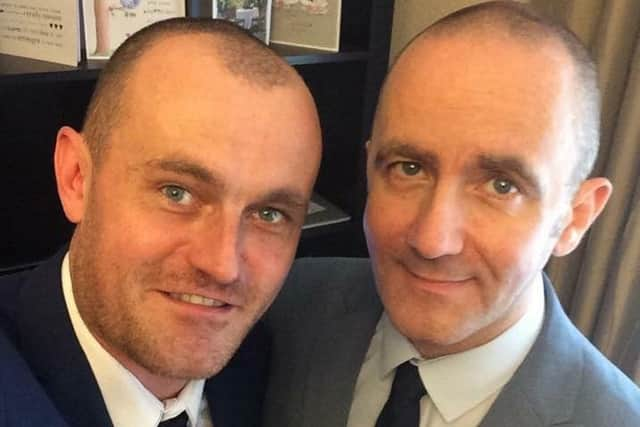Diabetic Gorgie man 'could have died' waiting on ambulance which failed to show after he collapsed - despite repeated 999 calls
and live on Freeview channel 276
A Gorgie man has hit out at the NHS after he ‘could have died’ waiting for an ambulance which did not arrive.
Jim Landels, 46, who has diabetes, collapsed with a severe hypoglycaemic attack on September 7.
Advertisement
Hide AdAdvertisement
Hide AdHis husband Grant desperately called for an ambulance, and was repeatedly told one was on its way.


But it did not arrive, and the couple heard nothing until three hours later when Grant received a call asking if Jim had become responsive.
Jim, who came to before the callback, said the service put Grant in a ‘terrible position’ leaving him alone to administer vital medication.
“If it hadn’t been for Grant I would have been dead,” he said.
Advertisement
Hide AdAdvertisement
Hide AdGrant gave Jim Glucogel, which raises blood glucose levels, but it took him an hour to administer as at first he could not open Jim’s mouth.
NHS Scotland advises that if a person is unresponsive due to a hypoglycaemic attack it is an ‘emergency situation’ and that an ambulance should be called.
The last thing Jim remembers is running a bath around 9.15pm.
Some minutes later a neighbour rang the doorbell to say that water was dripping into the flat below.
Advertisement
Hide AdAdvertisement
Hide AdGrant rushed to the bathroom to find his husband unconscious on the floor.
“He panicked and called my parents as he had never had to deal with this before, and they told him to call an ambulance,” said Jim.
Grant called an ambulance around 10.30pm, and was told one was on its way.
He then called again an hour later, and was again told that an ambulance was coming.
Advertisement
Hide AdAdvertisement
Hide AdAt 1.15am the ambulance service rang to ask if Jim had become responsive.
“I said if I wasn’t responsive by then I would have been dead. I thought it was a bit of a silly question,” said Jim.
He was told that as he was conscious no ambulance would be coming.
“I was quite disgusted by it to be honest,” he said.
Jim lodged a formal complaint with the Scottish Ambulance Service (SAS) in November, but heard nothing until the Evening News got in touch with the SAS this week.
Advertisement
Hide AdAdvertisement
Hide AdJim also contacted his MSP Sarah Boyack, who raised the case with Health Secretary Jeane Freeman.
Ms Freeman said the SAS has been trialling a new response model since 2016, and that the service may take more time to respond to ‘less urgent cases’.
She added that patients should receive regular call-backs, and that a wait of several hours was not acceptable.
MSP Sarah Boyack said: “Three hours is an unacceptable length of time to wait, either for an ambulance or a call-back, and this worrying incident surely demonstrates that the new ambulance response model is flawed and needs further investigation.”
Advertisement
Hide AdAdvertisement
Hide AdLibby Dowling of Diabetes UK, said: “People with diabetes can experience hypoglycaemia, or a hypo, when their blood sugar drops too low [...] severe hypos need to be treated very quickly, and if someone becomes unconscious and can’t be treated where they are, an ambulance will need to be called.”
A spokesperson for the Scottish Ambulance Service said: “Any avoidable delay to an ambulance response is unacceptable. We always aim to give each patient who contacts us the best treatment for their condition, ensuring we can prioritise patients with conditions – such as cardiac arrest – which has enabled us to save more lives.
“In this instance we initially triaged the call as low acuity and later, following a clinical reassessment, it was decided that no ambulance response was required. We have received a complaint, will be investigating this matter and thoroughly evaluating the response we provided.